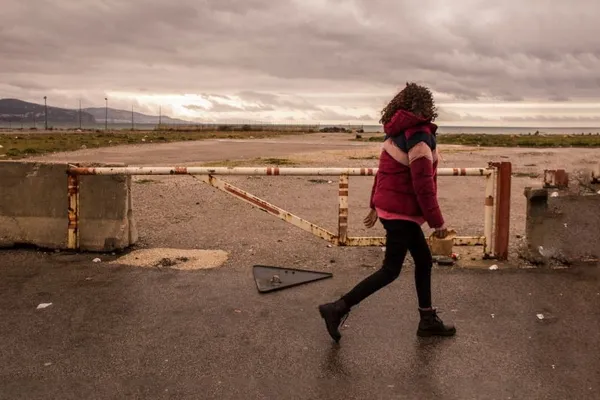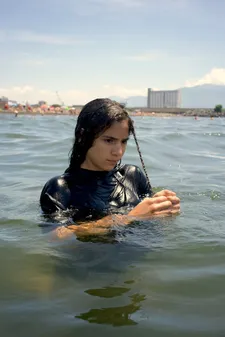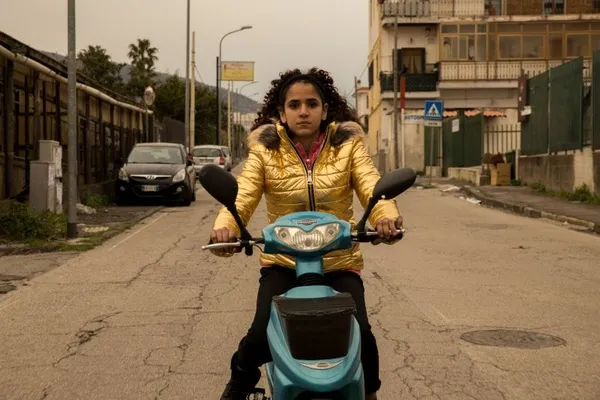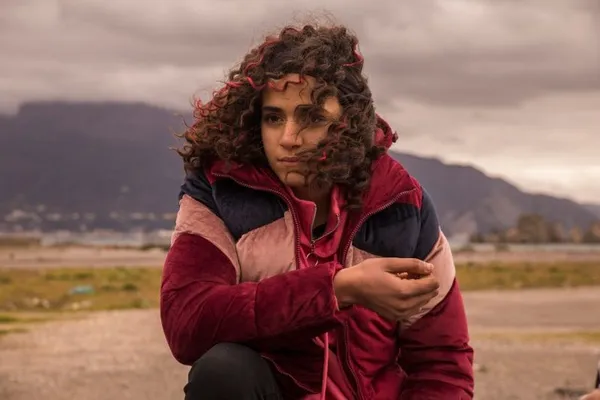Filmmakers Alessandro Cassigoli and Casey Kauffman have a background in documentary, which is perhaps why they were so willing to commit to a long-term project for their first fiction feature Californie. Inspired to make the film after meeting Khadija Jaafari during the course of their boxing documentary Butterfly - a scene from which is included within Californie - they worked with and followed her over three years, devising their fictional tale as they went. Jaafari plays Jamila, a Moroccan migrant to Italy, who finds her sense of identity shifting as she progresses through adolescence. I caught up with the directors after the film's premiere in Venice's Orizzonti section to talk about the film.
Amber Wilkinson: I have to commend you both on your level of commitment to a fiction feature. Do you think the fact that you had a background in documentary made it easier for you to sort of commit to this kind of long term fiction project?
Casey Kauffman: Oh, absolutely. People come to projects in different ways but the classic route of the people who are working in the fiction film world is you go to film school, you work on film sets, you have that background. And if you're doing your first fiction film, which probably isn't going to be some huge, well-financed thing, because it's your first one, you're probably looking to do something pretty efficiently, right, in terms of shooting. But I have this more journalistic and documentary background and, in the documentary world, it's not unheard of to follow characters over a long period of time. That comes with so many privileges, and also so many frustrations. But I think that Ali and I were, were used to that, and also the imprecisions, the imperfections and all the frustrations that come with shooting documentaries. Because so many times documentaries, they don't go according to your plan, and to a pre-written script. You're kind of writing, rewriting the story of the film afterwards in the edit. I think that the only reason we even thought about this project of filming over time and changing crafting it as we went along is because of all the kind of following over time we were used to doing in the past.
AW: You came across Khadija because she cropped up in Butterfly when you were filming that documentary? Do you use footage from Butterfly in this for those very early scenes of when she's very young?
Alessandro Cassigoli: Yeah, that scene that you see at the beginning of the film, it's a scene that there is in Butterfly, too. We were filming our protagonist (in Butterfly) and then Khadija entered our filming like this, randomly. There was kind of a scene in between her and Irma (the subject of the documentary), who is an older boxer and it was a powerful scene because of the theme of the film and because Khadija is kind of a strong character. So we were very impressed. And actually our editor during Butterfly, begins the film with the close up of Khadija. And then we were always thinking about this girl and during Q&As at festivals we were being asked, "But what about this little girl that we see at the beginning and at the end?" And then we became curious also, and we went back to Torre Annunziata. And it's quite strange because in California the first close up is of Jamila when she's 13. The two films almost start with the same shot - this girl at nine years old.
AW: The constant sense of reinvention is is very interesting at that age. I think it's funny because you really get a sense of the fact that children could be very spontaneous, especially at that age, some might call it impetuous. And sometimes that really works for them but as this film shows, it has a downside as well. How did you work then with Khadija with the script? Were you drawing on things that she'd experienced? I mean, I don't mean, in the sense of recreating her life, but I mean, in terms of emotion?
CK: Generally speaking, the process was to get to know Khadija, the real girl as much as possible. Family, friends, contacts, the boxing coach at the beginning, tons of interviews, recorded interviews, test filming, stuff like that. And then we'd go and write, write, write, and then we'd go down before the crew came and do test filming just with a handycam. Then we could enact some of our ideas. And then, depending on what worked and what didn't work, even that night before the crew got there, we'd rewrite it. So it was the case where, if something wasn't working because it was too distant from her own reality, her own view of the world or whatever, we wouldn't do it over and over again until she got it right, we would change it.
So we really kept it kind of close to home. And then we'd start the process over again, we do that over again, then we go down, you know, six months later, three months later, six months later, to see what else is going on in her life; where she now? So we hear the stories, get to understand where she was, emotionally and how she was feeling about things. And then we'd go back and write and we just do that process over and over again, for like, for basically three years. Even if the film covers five, that a little part comes from Butterfly, and then the majority of that process was 11 years old, 12 years old, 13 years old. It's impossible to quantify these things but I'd say, roughly speaking, a third of both the events and the kind of emotional state that's in the screenplay comes from her life, a third comes from the life of her older sister, who's in the film. And then probably a third also comes from stories of other teenagers or preteens that we've got to know in that region because Butterfly was also shot in that same town.
AW: I wondered as well, if you both drawn a little bit on your own experience, because you both have experiences of living in cultures that you didn't grow up in.
AC: For me, in Torre Annunziata is culturally different from from Florence from Rome but still you get into this culture quite easily, as we live here. But, for me, what was interesting about what you're saying is that I lived many years in Berlin, in Germany. And sometimes I had like, the same feeling that Jamila has for Morocco. For example, sometimes you're in Germany, and you're kind of missing Italy. But sometimes you're like idealising Italy, or you don't like the place where you are, but maybe it's not about the place where you are, maybe it's just about yourself. So, this kind of feeling towards the place where you're born and the place where you move to, I found that similar and probably that's also why we put this kind of sensation in the film.
AW: Yes, it's interesting in that she is torn between that sort of almost nostalgia for a place that she imagines. In the early part of the film, you see, initially, she seems quite out of place. And then of course, she's adopted all the mannerisms to fit in completely as children do. She's like, fully more Italian than an Italian.
AC: Absolutely. She speaks perfect dialect, you know, the real dialect from Torre Annunziata. She's really could be a girl from there.
CK: You know, the whole film is subtitled in Italian too. The Neapolitan dialect is so strong in the film that 80 per cent of the film, for Italians, has subtitles.
AW: The film also explores casual coercion and exploitation. The idea that Jamila is working for this hairdresser and, on the one hand, yes, it's giving her all sorts of things, material possessions, lots of attention, maybe stuff that she isn't getting emotionally from elsewhere. But on the other hand, it's really quite an exploitative relationship. But of course, as a child, she can't see that. Was that sort of social context something that you were keen to bring into the film?
 |
| We tried to be careful to not to not drive the social message home too hard, and we just wanted to keep it a story that was very kind of close to her emotionally in her worldview. |
CK: I have to say more generally, it's not like Alessandro and I started from the place of some kind of social context or some kind of a political message that we want to bring or comment on, you know, kids working under age or children of immigrants. We didn't start from one of these big themes. The decision to make this film was just because of our encounter with her, because we were convinced by the strength of her character. And then, of course, she is of a certain family and is from a certain social context. So all these things would emerge kind of naturally. We tried to be careful to not to not drive the social message home too hard, and we just wanted to keep it a story that was very kind of close to her emotionally in her worldview.
For example, that situation of her job, even though from a distance, she is being exploited, and she should be in school, and it's illegal for her to be doing that, it really is, in that chapter of the film, that she really did something good for herself. Like she improved herself, in a sense, right. Before we started the film, we didn't think, 'Oh, we want to, we want to, you know, bring this to light in the film'. But this was the direct story of her sister, first of all, and we had noticed even in our previous film that there was a very odd working relationship between some with some of these kids who are dropping out of middle school and their employers. They were lucky to have a job and the employers were taking care of them but there was also something completely wrong about it. You know, in our previous film, for example, our main character's little brother had the exact same relationship with the employer. He worked with a fishmonger and because the employer and even his mom were worried that he wouldn't wake up to go to the fish market 3am that he would actually spend the night in the shop and it seemed like a good solution for everybody. But if you take two steps back, what's a 13-year-old kid doing sleeping in the shop? So her work situation, even that scene of her sleeping in the shop, it comes from different situations that we saw there, and not because of something we wanted to drive home.
AC: It's a grey area and we ourselves don't have a real answer - that it's good that she's working there or it's not good. There is also the fact that these young kids like 12, 13 years old, sometimes they just go and they are picked by the Camorra mafia. And they go into that. So, for example, that's why the parents are sometimes kind of happy, you know, if they find a job, even if they're 12, or 13, and Okay, they don't go to school, but they also don't go there (the Camorra).
AW: I really like that sense of this sort of sense of constant effort on her part, which I guess comes from, from Khadija herself, even her moped needs to be pedalled. Was that sort of energy something you picked up from her?
CK: Yeah, absolutely. The whole choice to make a film was based on this sense that we got from her at an early age that she was sweet and charismatic, but also combative and feisty. She kind of had this mix. If she sets her mind to something, she's a hard worker is as well. And this was all for real and these were all attractive traits. And even though her emotional state was always in flux. As Alessandro often says, "Your objectives don't change just year to year they change day to day sometimes". Maybe the objectives would change in her conviction about life and what she wants. One year it's, "Oh, Italy is crap, I want to go back to Morocco". The next year, "Oh, this is the best thing in the world. I don't want to go back". We always felt the kind of struggling, combative, but somehow wanting to improve oneself spirit was always there. I really think that's one of the main reasons why we were we were confident to start a film with her without even knowing exactly at the beginning what the story was going to be about.
AW: Yes, she could have gone off you both and said, "Oh, well, that's that." Were you ever worried that that might happen?
CK: Did she get fed up with us? Oh yeah.
 |
| Alessandro Cassigoli: 'We like this kind of thing, that from one film, you go to another one, and that the characters can be in one film then in another, you know, they can cross' |
AW: So what is next for you guys because this has been an incredibly long term commitment to this town for you.
AC: Yeah, we have some ideas and ideas that are also there in this little town Torre Annunziata. Sometimes we think that this microcosm there could be a place for lots of stories. We like this kind of thing, that from one film, you go to another one, and that the characters can be in one film then in another, you know, they can cross. So who knows. We haven't started to write or to work on a new film yet, especially because the post production of California was really long and difficult.
AW: I was going to ask if it would be documentary or fiction but it sound as though docufiction is in your future.
AC: Yeah, I think this form, it's what we like, these hybrids.
AW: The nice thing about hybrids is you can bring some structure to it and some incident. And also, I guess, you have a bit more control than if you're doing a straightforward documentary.
CK: Yeah, I mean, after so many years of documentary journalism, just following realities to get to the facts. Alessandra and I think there's so much freedom in being able to write with the characters that we find but at the same time, we feel a real comfort level of structuring and crafting it with real people. We feel a comfort level right next to the realism of it all. Every project will require a different type of filmmaking slightly. But we kind of felt a sweet spot here and I really think that the next project we do, and the ones that we're currently thinking about, will be similar. Even though they'll be very close to reality and with real people and their real environments, I can see maybe it'll be one step more in the direction of fiction. The beginning of Californie - because we knew we want to make a film with, with Jamila, our main character, but we didn't know exactly where it was going - is a little bit more documentary and then we get into the writing a little bit more. I think, with our next film, we want to start already with the writing, even if it's right up against the real characters.
























